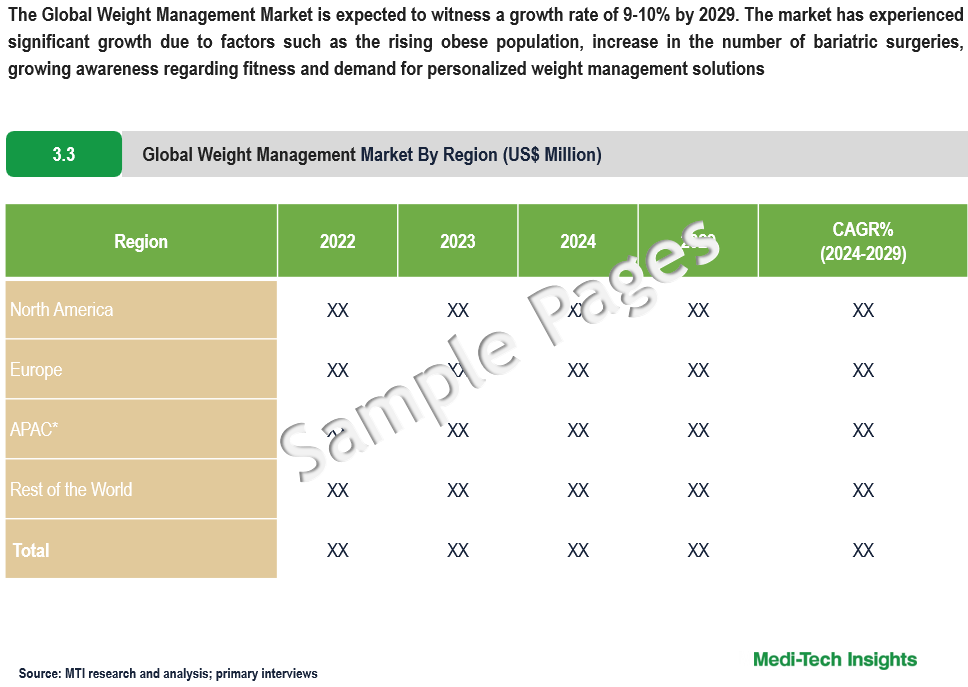Weight management is a crucial aspect of maintaining a healthy lifestyle. One of the fundamental aspects of weight management is maintaining a balanced diet. This involves consuming the right number of calories, nutrients, and portion control. Regular physical activity is essential for weight management, burning calories, building muscle, and improving overall fitness. Lifestyle elements, including stress management, ensuring sufficient sleep, and reducing factors that may lead to weight gain or complicate weight management, also play a pivotal role in maintaining a healthy weight. To summarize, weight management involves a combination of healthy eating, regular physical activity, and making healthy lifestyle choices to achieve and sustain a desired weight or body composition.
Rising Obesity, Sedentary Lifestyle, and Growing Digitalization & Public Awareness Related to Weight Management Fuel the Market
The prevalence of chronic illnesses linked to obesity, such as diabetes, hypertension, and orthopedic conditions, is widespread among individuals who are overweight or obese. This has driven the growth of the weight management industry, particularly as obesity rates continue to rise. Obesity represents a significant public health challenge, prompting pharmaceutical companies to create medications to address it. Several prescription drugs authorized by regulatory agencies are available in the market for obesity treatment. With growing awareness of the health risks associated with obesity, more people are seeking medical treatments, resulting in increased demand for these medications.
Extended screen time, mainly due to television and computer usage, is contributing to a sedentary lifestyle among overweight or obese children, increasing their vulnerability to chronic diseases. This weight gain is worsened by the consumption of unhealthy fast food, reduced physical activity, and the stresses and time pressures of contemporary life. Consequently, the weight management industry is expanding in response to these challenges.
The easy accessibility of information, facilitated by globalization and digitalization, has heightened public awareness about various weight management approaches, including dietary products, supplements, exercise, and surgical procedures. For instance,
- In February 2024, Spatz Medical announced the start of commercializing the Spatz3 Adjustable Gastric Balloon, following its successful deployment to over 150,000 patients in over sixty global markets, as the company prepares to introduce this innovative technology in the United States.
- In February 2024, ReShape Lifesciences disclosed the commencement of initial surgeries employing the Next-Generation Lap-Band® 2.0 FLEX, integrating FLEX Technology to improve patient satisfaction, offering a minimally invasive, FDA-approved long-term obesity treatment option as an alternative to more invasive surgical methods like gastric bypass or sleeve gastrectomy.
- In January 2024, Allurion Technologies, Inc. announced that Somerset NHS Foundation Trust is the first NHS trust in the UK to introduce the Allurion Gastric Balloon, the only swallowable gastric balloon requiring no surgery, endoscopy, or anaesthesia. The balloon, which remains in the stomach for about four months before self-emptying and passing naturally, helps patients lose an average of 10-15% of their body weight, with studies showing that 96% of the weight loss can be sustained one year after the balloon passes.
Additionally, the rising acceptance of fitness facilities and dietary programs in developing countries is anticipated to present substantial growth prospects during the forecast period. Specifically, the GenX generation is poised to be a prominent target demographic for fitness clubs. Also, fitness clubs that provide premium amenities like advanced equipment, metabolic testing tools, and yoga studios are expected to provide lucrative opportunities for the weight management market in the upcoming period.
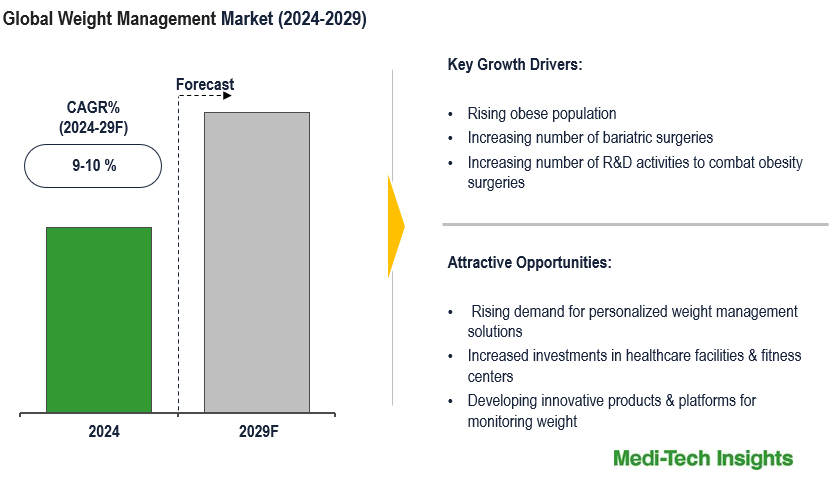
To learn more about this report, download the PDF brochure
Preventive Healthcare and Wellness: Boosting Demand in Weight Management Market
The weight management market is experiencing growth due to several significant factors. Primarily, the global increase in obesity rates and the associated health issues, such as diabetes, cardiovascular diseases, and joint problems, highlight the pressing need for effective weight management solutions. As people become more aware of the health risks linked to excess weight, they are actively seeking methods for achieving sustainable weight loss and maintaining healthier lifestyles. The rising recognition of the importance of preventive healthcare and wellness promotion encourages individuals to take proactive measures to address weight-related concerns before they develop into chronic conditions. This emphasis on prevention is fueling the demand for diverse weight management programs and services that cater to various needs and preferences.
The weight management industry is continually evolving. Recent trends include a shift towards holistic approaches that focus on overall health, and well-being, as well as the integration of technology through smartphone apps and wearable devices for tracking physical activity and nutrition. The weight management industry focuses on products and services designed to help people achieve and maintain a healthy weight. It includes a wide range of products and approaches, from dietary supplements and weight loss programs to fitness equipment and meal replacement products. Several companies are prominent in the weight management market, including pharmaceutical companies that produce weight loss medications, nutrition and supplement companies, fitness equipment manufacturers, and providers of weight loss and wellness programs. For instance,
- In March 2024, Labcorp announced its new Weight Loss Management portfolio, which includes educational resources and convenient testing solutions to help individuals and their physicians monitor health indicators and inform treatment options such as lifestyle changes or bariatric surgery
- In September 2023, ReShape Lifesciences signed an exclusive, royalty-bearing license agreement with Biorad Medisys Pvt. Ltd. to manufacture, commercialize, and distribute the Obalon® Gastric Balloon System across the Indian subcontinent, covering approximately 20% to 25% of the world’s population
- In June 2023, Allurion announced a pilot collaboration agreement with Medtronic to expand access to its AI-powered weight loss program, the Allurion Balloon, and the Allurion Iris AI Platform for managing bariatric surgery patients in the CEMA region, leveraging Medtronic’s sales channels
- In March 2022, KaraMD introduced Pure Health Apple Cider Vinegar Gummies, which are vegan gummies formulated to encourage ketosis, regulate digestion, assist in weight management, and boost energy levels in the body
Key Constraints/Challenges
Stringent regulations and labeling requirements pose hurdles for weight management product manufacturers and complying with these regulations can be costly and time-consuming for these businesses. Furthermore, addressing consumer expectations for quick fixes rather than finding sustainable approaches is a major challenge. The weight management market is highly competitive, making it difficult for companies to stand out. Shifting consumer preferences and economic disparities can also impact market growth.
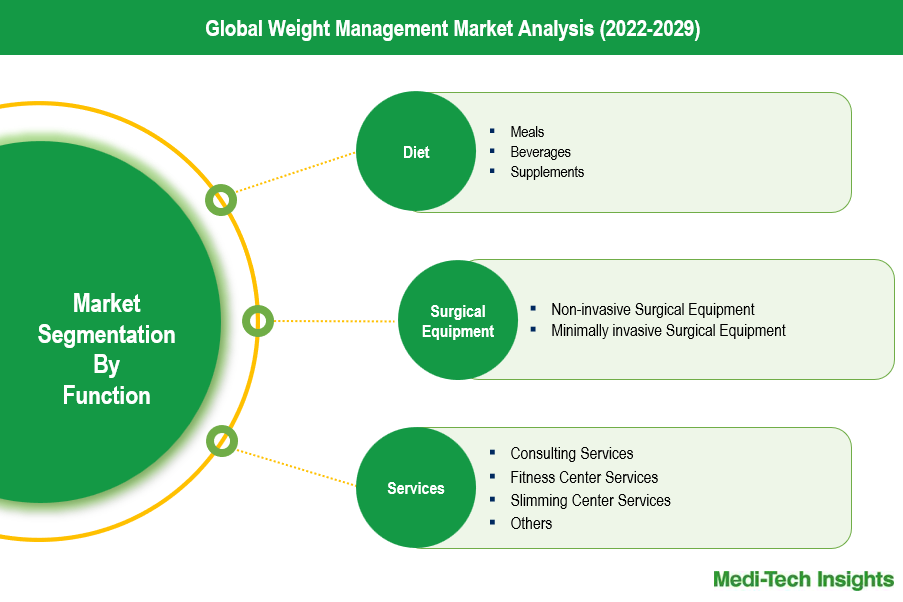
To learn more about this report, download the PDF brochure
Function Segment Outlook
In the weight management market, function segments cater to different aspects of weight loss and maintenance. The diet segment encompasses a wide range of products and plans aimed at controlling calorie intake and promoting healthy eating habits. This includes meal replacement shakes, dietary supplements, and personalized meal plans. The diet segment holds a significant portion of the market share due to its accessibility and popularity among individuals seeking to manage their weight. Surgical equipment, another crucial segment, offers medical interventions such as gastric balloons, gastric bands, and gastric bypass surgeries, providing more aggressive options for weight loss for individuals with severe obesity. While this segment represents a smaller portion of the market due to its invasive nature and associated risks, it is growing steadily as advancements in technology improve safety and efficacy. Additionally, services play a vital role in the weight management market, offering support, guidance, and accountability to individuals on their weight loss journey. These services include medical weight loss clinics, fitness centers, and behavioural counselling programs. Despite holding a smaller market share individually, services contribute significantly to the overall weight management market by complementing other segments and providing holistic approaches to weight loss and maintenance.
End-User Segment Outlook
The weight management end-user segment is primarily composed of nutritionists and dietitians, fitness centers, and medical weight loss clinics. Nutritionists and dietitians play a crucial role in developing personalized dietary plans and providing ongoing support to individuals seeking to manage their weight. Fitness centers offer structured exercise programs and access to specialized equipment, making them popular among those looking to incorporate regular physical activity into their weight management regimen. Medical weight loss clinics provide comprehensive services that may include medical supervision, prescription medications, and surgical options for weight loss. Collectively, these end users represent a significant portion of the weight management market, with fitness centers holding a substantial share due to their widespread accessibility and the growing popularity of fitness culture. Nutritionists and dietitians also command a notable share, driven by increasing awareness of the importance of dietary management in weight loss. Medical weight loss clinics, while catering to a more niche segment, contribute significantly due to their specialized services and expertise in handling complex cases.
North America Accounts for the Largest Share of the Global Market
North America holds a dominant position in the weight management market owing to its developed healthcare infrastructure, extensive medication usage, increasing prevalence of chronic conditions like obesity, high cholesterol, diabetes, and heart diseases, along with a burgeoning research landscape.
On the other hand, the Asia-Pacific region is poised for substantial growth during the forecast period which can be attributed to factors such as heightened government initiatives to promote awareness, expanding research activities, the presence of vast untapped markets, a large population base, an upsurge in cardiovascular diseases, and an increasing demand for high-quality healthcare services within the region.
Competitive Landscape
The key players operating in the market include Atkins Nutritionals, Inc., Herbalife Ltd., Nutrisystem Ltd., Kellogg Company, Olympus Corporation, The Gold’s Gym International, Brunswick Corporation, Amer Sports, and Johnson Health Tech among others
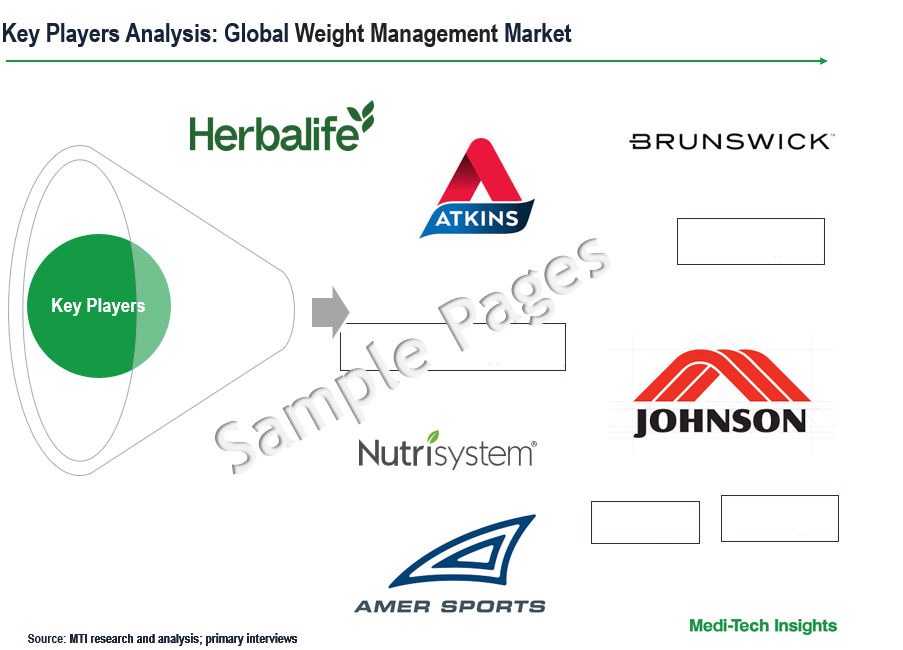
Get a sample report for competitive landscape analysis
Organic and Inorganic Growth Strategies Adopted by Players to Establish Their Foothold in the Market
Players operating in this market are adopting both organic and inorganic growth strategies such as collaborations, and acquisitions to garner market share. For instance,
- In March 2023, Johnson Fitness & Wellness (JFW), the retail arm of Johnson Health Tech and the world's largest speciality fitness retailer, revealed its plans to establish 17 retail outlets as well as a commercial sales and service division in Texas, United States
- In September 2020, Life Fitness launched the Axiom Series, a diverse collection of strength equipment that comprises 10 single-exercise and eight dual-exercise selectorized machines, a dual adjustable pulley, and 12 benches and racks. It is designed to cater to a variety of fitness facilities, including health clubs, multi-unit housing, and hospitality venues. The Axiom Series stands out for its user-friendly biomechanics and visually appealing design, making it suitable for a global audience with diverse fitness requirements
The market is expected to gain further momentum in the coming years due to rising awareness related to health and wellness, coupled with the desire to maintain a healthy lifestyle, demand for weight management products, technological innovations, and aggressive organic and inorganic growth strategies followed by the players.
Weight Management Market Futures and Scope
|
Report Scope
|
Details
|
|
Base Year Considered
|
2023
|
|
Historical Data
|
2022 - 2023
|
|
Forecast Period
|
2024 - 2029
|
|
CAGR (2024-2029)
|
9-10%
|
|
Segment Scope
|
Function (Diet, Surgical Equipment, Services) & End User
|
|
Regional Scope
|
- North America (U.S. & Canada)
- Europe (UK, Germany, France, Italy, Spain, Rest of Europe)
- Asia Pacific (China, India, Japan, Rest of Asia Pacific)
- Rest of the World (Latin America, Middle East & Africa)
|
|
Key Companies Mapped
|
Atkins Nutritionals, Inc., Herbalife Ltd., Nutrisystem Ltd., Kellogg Company, Olympus Corporation, The Gold’s Gym International, Brunswick Corporation, Amer Sports, and Johnson Health Tech among others
|
|
Report Highlights
|
Market Size & Forecast, Growth Drivers & Restraints, Trends, Competitive Analysis
|
Key Strategic Questions Addressed
-
What is the market size & forecast for the Global Weight Management Market?
-
What are the historical, present, and forecasted market shares and growth rates of various segments and sub-segments of the Global Weight Management Market?
-
How has COVID-19 impacted the Global Weight Management Market?
-
What are the major growth drivers, restraints/challenges impacting the market?
-
What are the opportunities prevailing in the market?
-
What is the investment landscape?
-
Which region has the highest share in the global market? Which region is expected to witness the highest growth rate in the next 5 years?
-
Who are the major players operating in the market? What is the competitive positioning of key players?
-
Who are the new players entering the market?
-
What are the key strategies adopted by players?
The study has been compiled based on extensive primary and secondary research.
Secondary Research (Indicative List)
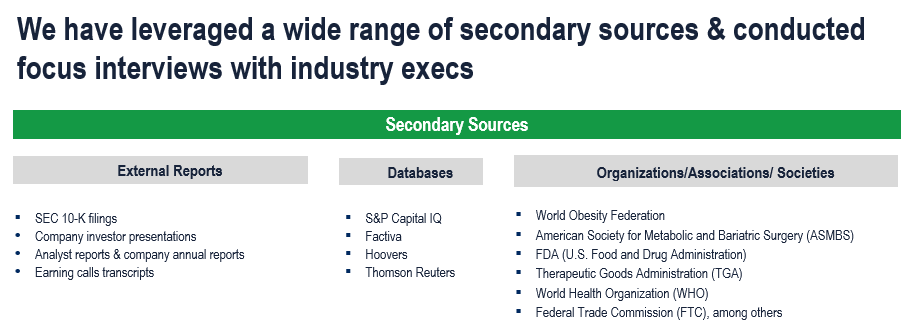
Primary Research
To validate research findings (market size & forecasts, market segmentation, market dynamics, competitive landscape, key industry trends, etc.), extensive primary interviews were conducted with both supply and demand-side stakeholders.
Supply Side Stakeholders:
- Senior Management Level: CEOs, Presidents, Vice-Presidents, Directors, Chief Technology Officers, Chief Commercial Officers
- Mid-Management Level: Product Managers, Sales Managers, Brand Managers, Business Development Managers, Consultants
Demand Side Stakeholders:
- Stakeholders in Nutritionists and Dietitians, Fitness Centers, and Medical Weight Loss Clinics, among others
Breakdown of Primary Interviews
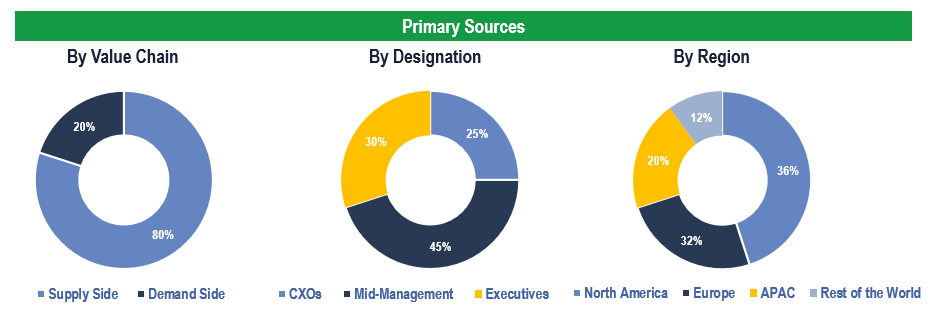
Market Size Estimation
Both ‘Top-Down and Bottom-Up Approaches’ were used to derive market size estimates and forecasts.
Data Triangulation
Research findings derived through secondary sources & internal analysis were validated with Primary Interviews, Internal Knowledge Repository, and Company Sales Data.







